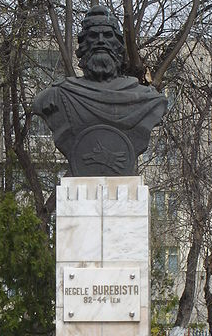Burebista
| Burebista | |
|---|---|
| King of Dacia | |

Statue of Burebista located in Cǎlǎrași.
|
|
| Reign | 82/61–44 BC |
| Died | 44 BC |
Burebista (Ancient Greek: Βυρεβίστας, Βοιρεβίστας) was a Thracian king of the Getae and Dacian tribes from 82/61 BC to 44 BC. He was the first king who successfully unified the tribes of the Dacian kingdom. The Dacian kingdom comprises the area roughly located between the Danube, Tisza and Dniester rivers and covering modern day Romania. In the 7th and 6th Centuries BC it became home to the Thracian peoples, including Getae and Dacians. From the 4th century to the middle of the 2nd century BC the Dacian peoples were influenced by La Tène Celts who brought new technologies with them into Dacia. Sometime in the 2nd century BC, however, the Dacians expelled the Celts from their lands. Dacians often warred with the Getae, however, the relative isolation of the Dacian peoples located around the Carpathian mountains allowed them to survive and even to thrive. By the 1st century BC, the Dacians had become the dominant tribe.
As king Burebista pursued both reform and conquest. His second in command, Deceneus, was responsible for the development of religious and social reform. Creating a caste of priests, brought about sobriety into the Dacian kingdom, and unified the tribes. During this time Burebista built a system of citadels throughout the Orăştie Mountains and moved the capital from Argedava to Sarmizegetusa. These citadels were of a Greek military architecture. Their function was to secure the obedience of the Dacian peoples internally.
From 61 BC onwards, Burebista pursued a series of conquests that expanded the Dacian kingdom. The tribes of the Boii and Taurisci were destroyed early in his campaigns, further pursuing the conquest of the Bastarnae and probably Scordisci peoples. He led raids throughout Thrace, Macedonia and Illyria. In 61 BC he may also have been involved in the Battle of Histria, where Roman Governor of Macedonia Gaius Antonius Hybrida was defeated and expelled from the area. From 55 BC, the Greek cities on coast of the Black Sea were conquered one after another. These campaigns inevitably culminated in conflict with Rome in 48 BC when Burebista gave his support to Pompey. In turn this made him an enemy to Caesar who became determined to start a campaign against Dacia. This plan fell through in 44 BC when he was assassinated. Soon after, Burebista himself was assassinated in a plot by the tribal aristocracy.
...
Wikipedia
